Related Research Articles

Earl Eugene Scruggs was an American musician noted for popularizing a three-finger banjo picking style, now called "Scruggs style", which is a defining characteristic of bluegrass music. His three-finger style of playing was radically different from the traditional way the five-string banjo had previously been played. This new style of playing became popular and elevated the banjo from its previous role as a background rhythm instrument to featured solo status. He popularized the instrument across several genres of music.
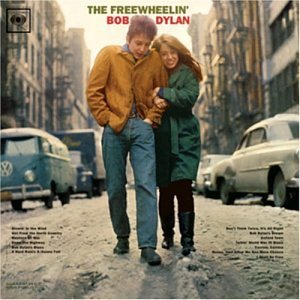
The Freewheelin' Bob Dylan is the second studio album by the American singer-songwriter Bob Dylan, released on May 27, 1963, by Columbia Records. Whereas his self-titled debut album Bob Dylan had contained only two original songs, this album represented the beginning of Dylan's writing contemporary lyrics to traditional melodies. Eleven of the thirteen songs on the album are Dylan's original compositions. It opens with "Blowin' in the Wind", which became an anthem of the 1960s, and an international hit for folk trio Peter, Paul and Mary soon after the release of the album. The album featured several other songs which came to be regarded as among Dylan's best compositions and classics of the 1960s folk scene: "Girl from the North Country", "Masters of War", "A Hard Rain's a-Gonna Fall" and "Don't Think Twice, It's All Right".
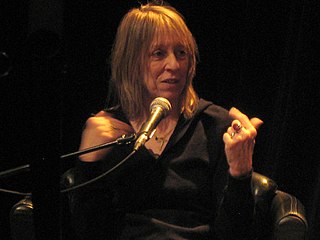
Susan Elizabeth Rotolo, known as Suze Rotolo, was an American artist, and the girlfriend of Bob Dylan from 1961 to 1964. Dylan later acknowledged her strong influence on his music and art during that period. Rotolo is the woman walking with him on the cover of his 1963 album The Freewheelin' Bob Dylan, a photograph by the Columbia Records studio photographer Don Hunstein. In her book A Freewheelin' Time: A Memoir of Greenwich Village in the Sixties, Rotolo described her time with Dylan and other figures in the folk music and bohemian scene in Greenwich Village, New York. She discussed her upbringing as a "red diaper" baby; a child of Communist Party USA members during the McCarthy Era. As an artist, she specialized in artists' books and taught at the Parsons School of Design in New York City.

Bob Dylan's Greatest Hits Vol. II, also known as More Bob Dylan Greatest Hits, is the second compilation album by American singer-songwriter Bob Dylan, released on November 17, 1971 by Columbia Records. With Dylan not expected to release any new material for an extended period of time, CBS Records president Clive Davis proposed issuing a double LP compilation of older material. Dylan agreed, compiling it himself and suggesting that the package include a full side of unreleased tracks from his archives. After submitting a set of excerpts from The Basement Tapes that Davis found unsatisfactory, Dylan returned to the studio in September 1971 to recut several Basement songs, with Happy Traum providing backup.

Henry Thomas was an American country blues singer, songster and musician. Although his recording career, in the late 1920s, was brief, Thomas influenced performers including Bob Dylan, Taj Mahal, the Lovin' Spoonful, the Grateful Dead, and Canned Heat. Often billed as "Ragtime Texas", Thomas's style is an early example of what later became known as Texas blues guitar.
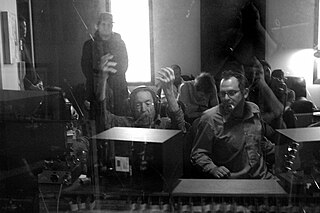
Donald William "Bob" Johnston was an American record producer, best known for his work with Bob Dylan, Johnny Cash, Leonard Cohen, and Simon & Garfunkel.

Bob Dylan is an American singer-songwriter. Often considered one of the greatest songwriters of all time - and "the greatest of all time" according to Rolling Stone Magazine's 2020 ranking of songwriters - Dylan has been a major figure in popular culture over his 60-year career. He rose to prominence in the 1960s, when songs such as "The Times They Are a-Changin'" (1964) became anthems for the civil rights and antiwar movements. Initially modeling his style on Woody Guthrie's folk songs, Robert Johnson's blues and what he called the "architectural forms" of Hank Williams's country songs, Dylan added increasingly sophisticated lyrical techniques to the folk music of the early 1960s, infusing it "with the intellectualism of classic literature and poetry". His lyrics incorporated political, social and philosophical influences, defying pop music conventions and appealing to the burgeoning counterculture.
"Bob Dylan's Blues" is a song written and performed by the American singer-songwriter Bob Dylan, that was first released as the fifth track on his 1963 album, The Freewheelin' Bob Dylan.

Blue Ridge is the sixth studio album released by American singer-songwriter Jonathan Edwards. It features the bluegrass band, The Seldom Scene.
"Salty Dog Blues" is a folk song from the early 1900s. Musicians have recorded it in a number of styles, including blues, jazz, country music, bluegrass. Papa Charlie Jackson recorded an adaptation for Paramount and Broadway in 1924. According to Jas Obrecht, "Old-time New Orleans musicians from Buddy Bolden’s era recalled hearing far filthier versions of 'Salty Dog Blues' long before Papa Charlie’s recording." Similar versions were recorded by Mississippi John Hurt and Lead Belly.
"You Ain't Goin' Nowhere" is a song written by American musician Bob Dylan in 1967 in Woodstock, New York, during the self-imposed exile from public appearances that followed his July 29, 1966 motorcycle accident. A recording of Dylan performing the song in September 1971 was released on the Bob Dylan's Greatest Hits Vol. II album in November of that year, marking the first official release of the song by its author. Earlier 1967 recordings of the song, performed by Dylan and the Band, were issued on the 1975 album The Basement Tapes and the 2014 album The Bootleg Series Vol. 11: The Basement Tapes Complete.

Randy Lynn Scruggs was an American music producer, songwriter and guitarist. He had his first recording at the age of 13. He won four Grammy Awards and was named Musician of the Year at the Country Music Association Awards three times. He was the middle son of Earl Scruggs and Louise Scruggs.

The Original Mono Recordings is a box set compilation album of recordings by Bob Dylan, released in October 2010 on Legacy Recordings, catalogue 88697761042. It consists of Dylan's first eight studio albums in mono on nine compact discs, the album Blonde on Blonde being issued on two discs in its original vinyl format. It does not include the singles collection Bob Dylan's Greatest Hits released during the same time span. The set includes a 56-page booklet with photographs, discographical information, and an essay by Greil Marcus. It peaked at No. 152 on the Billboard 200.

The 50th Anniversary Collection: The Copyright Extension Collection, Volume 1 is the first collection by Bob Dylan that Sony Music released to prevent the recordings from legally entering the public domain in Europe. The album features studio and live recordings from 1962 that have not previously been commercially released. Sony reportedly released only 100 copies each of the four-CD-R "1962" set. The set was released only in Europe.
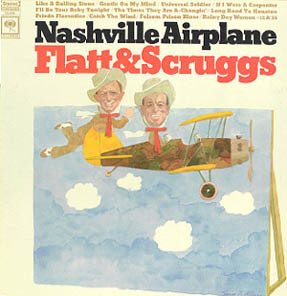
Nashville Airplane is the 27th album by Lester Flatt and Earl Scruggs released in 1968 on the Columbia Limited Edition label. It was recorded shortly before their breakup in 1969. Lester Flatt resisted the change in direction to a point that led to the breakup.
Bob Dylan is an American musician, singer-songwriter, music producer, artist, and writer. He has been an influential figure in popular music and culture for more than five decades. Much of his most celebrated work dates from the 1960s when he was an informal chronicler and a seemingly reluctant figurehead of social unrest.
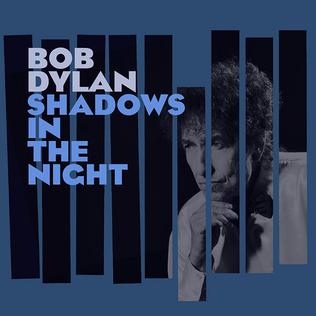
Shadows in the Night is the thirty-sixth studio album by Bob Dylan, released by Columbia Records on February 3, 2015. The album consists of covers of traditional pop standards made famous by Frank Sinatra, chosen by Dylan. Like most of his 21st century output, Dylan produced the album himself under the pseudonym Jack Frost.
"Going Down The Road Feeling Bad" is a traditional American folk song, "a white blues of universal appeal and uncertain origin". The song is catalogued in the Roud Folk Song Index as No.4958.
"I Shall Be Free" is a song by American singer-songwriter Bob Dylan. It was recorded on 6 December 1962 at Studio A, Columbia Recording Studios, New York, produced by John Hammond. The song was released as the closing track on The Freewheelin' Bob Dylan on 27 May 1963, and has been viewed as a comedic counterpoint to the album's more serious material. Dylan has never performed the song in concert.
References
- 1 2 Harvey, Todd (October 1, 2001). The Formative Dylan: Transmission and Stylistic Influences, 1961–1963. Scarecrow Press. ISBN 978-0810841154.
- ↑ Henry Thomas –Honey Won't You Allow Me One More Chance, Composed by Traditional at AllMusic . Retrieved September 13, 2015.
- ↑ Henry Thomas –Honey, Won't You Allow Me One More Chance at AllMusic . Retrieved September 13, 2015.
- ↑ Honey Won't You Allow Me One More Chance at AllMusic . Retrieved September 13, 2015.
- ↑ Henry Thomas –Honey, Won't You Allow Me One More Chance?, Composed by Traditional at AllMusic . Retrieved September 13, 2015.
- ↑ Henry Thomas –Honey Just Allow Me One More Chance at AllMusic . Retrieved September 13, 2015.
- ↑ Bob Dylan –Honey, Just Allow Me One More Chance [Incomplete , Composed by Bob Dylan] at AllMusic . Retrieved September 13, 2015.
- ↑ Bob Dylan –Honey Just Allow Me One More Chance at AllMusic . Retrieved September 13, 2015.
- ↑ Bob Dylan –Honey, Just Allow Me One More Chance, Composed by Bob Dylan / Henry Thomas at AllMusic . Retrieved September 13, 2015.
- ↑ Bob Dylan –Honey, Just Allow Me One More Chanse at AllMusic . Retrieved September 13, 2015.
- ↑ Flatt & Scruggs –Honey, Just Allow Me One More Chance, Composed by Bob Dylan at AllMusic . Retrieved September 13, 2015.
- ↑ Flatt & Scruggs / Lester Flatt / Earl Scruggs –Honey, Just Allow Me One More Chance, Composed by Bob Dylan at AllMusic . Retrieved September 13, 2015.
- ↑ Flatt & Scruggs –Final Fling at AllMusic . Retrieved September 13, 2015.
- ↑ Fernando Goin –Honey, Just Allow Me One More Chance, Composed by Traditional at AllMusic . Retrieved September 13, 2015.
- ↑ Fernando Goin –Mystery Train at AllMusic . Retrieved September 13, 2015.